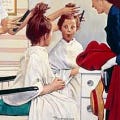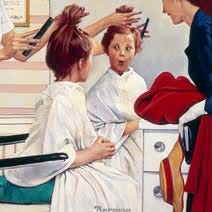I have been pondering who is to blame for the misconception of the “normal” American Family that we all struggle to overcome when our own families don’t quite measure up. Okay, forget the “don’t quite measure up.” Let’s call a spade a spade: Our families look nothing like the Leave it to Beaver, or even Modern Family models that we all love to turn on each week. There is no sign of the real sadness, anger, and stress of being part of an American family, and this makes us feel isolated in our inability to get it right. And, then there is the environment they live in lacking in the unmade beds or dishes in the sink that beg to be found out if anyone were to drop by your house on a given day. Maybe that’s why no one drops by anymore. And please do not get me started about the way Facebook/Instagram/TikTok enables us to re-write our daily lives into smiling faces and fabulous news that hide the real ebb and flow emotions of our own reality.
Anyway, I’ve figured it out. It’s Norman’s fault. Yep, Norman Rockwell, who happens to have the same birthday as me. He set up this ridiculous measuring stick that has no basis in reality. His artistic masterpiece covers for The Saturday Evening Post of happy, happy, happy Thanksgiving dinners and American life portraits were clearly set nowhere near my family’s Thanksgiving dinners, to which I was assigned to bring cranberry sauce in a can because no one liked me. Or Christmas when I was little, when my mother once gave me of a picture of myself as a gift. I immediately realized it was a photo of my sister, not me, which confirmed that no one ever took pictures of me when I was little because I wasn’t cute. (I’m cuter now. Actually, I was cuter in my twenties and thirties than I am now, but who wasn’t?) Anyway, the point is that Norman set us up to believe that someone, somewhere in America, was living the way his 322 Saturday Evening Review covers depicted, and he knew he was lying.
Norman was married three times and suffered from depression throughout most of his adult life. His repressed sexuality (he painted lots of men and boys), fear of women, and a fascination with manhood seem to stand out as his personal struggle, according to his biographer, Deborah Soloman, who worked on his biography, American Mirror: The Life of Norman Rockwell, for ten years. Of his 322 covers, only three depict a traditional family of parents and children. Who knew?
Soloman’s look at Rockwell has drawn a lot of criticism from those who prefer to let his paintings’ depiction of life be seen as his life’s reality, which was clearly not the case. His life was filled with the dark side that never saw the light of day in his paintings. His shrink, for example, spoke of suicidal moments and repressed everything. One of this models jumped out a window after he dropped him with nary a word, as was the painter’s habit. When Deborah Soloman spoke in Stockbridge, Massachusetts, a woman in the audience stood up and said, “You’ve taken all the optimism out of Rockwell’s work.” Well, girlfriend, wake up and smell the paint brush. His work wasn’t portraits after all, but rather something I’m going to dub American Surrealism Under the Guise of Portraits. It sets everyone up for failure by encouraging them to reach for something that doesn’t exist. It’s like You’ve Got Mail, or Pretty Woman, two movies that depict love in such an unrealistic way that many women never find men who measure up. More American Surrealism. Hey, I’m just the messenger. And, I’m a reluctant messenger. I love Rockwell’s work and Pretty Woman and You’ve Got Mail are two films I watch at least once a year.
So, don’t get me wrong here. I write this not to complain about any lack of fabulousness in life; I love my life, past, present, and hopefully my future. But it’s important to recognize that there are ups and downs and imperfections and shades of gray in everything, and to accept this and realize that no one’s life is perfect makes those parts of our daily life so much easier to bear. If Norman had painted the kid getting his first haircut crying, instead of with that silly look of happy surprise, he might have given us a better mirror of our own lives. Couldn’t one face in the Thanksgiving Feast have been sullen? Just one out of the eleven in the picture? Come on, give a girl a break here. Make me feel at home.
So Norman, I forgive you. And after reading about your life a bit, I will say that it must have been hard to be held to a standard you knew didn’t exist, but which you somehow must have thought could exist. Or should exist.
7 Comments
5 more comments...No posts




Like ever depressed comedian, Norman Rockwell was painting life as he wished it to be.
I blame the TV show "Father Knows Best". Even the title infuriates me. As for painting life, I prefer the life painted by Maxfield Parrish... realms of enchantment and beauty and fun.